
Secular Redemption
According to the latest Gallop poll, from 1937 to 1998, church membership remained relatively constant, hovering at about 70 percent. Over the past two decades, that number has dropped to less than 50 percent, the sharpest recorded decline in American history.
Sometimes it takes someone else to hold up a rhetorical mirror to us to see why this is. Shadi Hamid, does that in an article in The Atlantic entitled “America without God,” April 2021. Much of what I write here I owe to this article. “As religious faith has declined, (Hamid writes) ideological intensity has risen. “What was once religious belief has now been channeled into political belief.”
He uses the famous speech by Martin Luther King Jr. as an example “I Have a Dream.” King wishes that “One day this nation will rise up and live out the true meaning of its creed.” Normally creed refers to a religion. But the thought that a nation might have a creed says something about the uniqueness of America. As Abraham Kuyper, a theologian at the dawn of the 20th century wrote, “every deeply felt conviction is sublimated religion.”
What has happened in America is that we have turned political debates into incorporeal or metaphysical issues envisioning a utopia. Robert F. Kennedy said that we must tame the savageness of man in order to make this a more gentle and tolerant world. On the other hand there are those who believe getting rid of the “bad guys,” getting rid of the “deplorables” or “enemies of the state,” will bring about a united people. Again, this is like turning a political issue into a metaphysical question according to man’s own purpose for himself.
But the “promised land” is above, and the matter of who is a “sheep” verses a “goat” and who feels what about anything does not matter in the least to the omnipotent God. But that is what happens when politics become a religion. It then becomes a matter of what’s up ahead like working towards a more gentle people or people of “one creed,” or getting rid of the “bad guys” or bad ideologies.
Abraham Kuyper, a theologian at the dawn of the 20th century wrote that “deeply felt convictions are sublimated religious convictions.” For no people can exist for long without some loyalty to something. So if it didn’t come from traditional religious beliefs, it would come from some form of nationalism, socialism, or liberalism. Samuel Goldman calls this the “law of the conservation of religion.” In every society throughout the world there is a constant supply of many people, including the young, who have turned their backs on the church and are looking for secular solutions [corporeal] to metaphysical matters by trying to find these meanings in their own lives.
And that’s the problem; these belief systems are becoming much more diverse and contentious. Conflicting ideologies do not have the ability to resolve themselves. I agree with Shadi Hamid. “If only we could believe less in political issues [political issues of every sort].
But I believe that the loss of membership in churches is due rather to the churches failure to proclaim the good news that salvation is given to people who come to realize that redemption is not found in this world.
That God was in Christ reconciling the world to Himself, not imputing their trespasses to them, and has committed to us the word of reconciliation.
2 Corinthians 5:19 nkjv
This does not mean that we should abandon the world and cloister in some remote area of the world. Rather the God who created this world, as found in the book of Genesis, is the same God who revealed Himself through Jesus Christ who came as a real human being into this world to reconcile “the world unto His Father.” To accomplish this God sent His Spirit (metaphysical Spirit) into this world to gather His people into one nation, a different nation, the Kingdom of God.
Let us pray this prayer together. “Thy kingdom come, Thy will be done on earth as it is in heaven.”